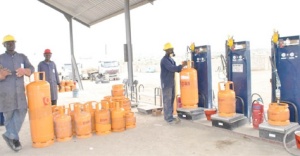Cooking gas marketers under the aegis of the Nigerian Association of Liquefied Petroleum Gas Marketers (NALPGAM) have accused 15 terminal operators, who buy product from the Nigerian Liquefied Natural Gas (NLNG) Limited, of exploiting Nigerians by inflating the price of gas being sold to gas plant owners by over N7 million per 20 Metric Tonnes (MT).
President of the association, Mr Oladapo Olatunbosun who made the allegation during the association’s visit to the Senate, stated that the affected companies, whom he described as the ‘cabals’ were exploiting Nigerians with outrageous prices and causing the product not be available in the market.
The NALGAM President told the Senate that the NLNG had been consistent with its supply of LPG to the domestic market, but that the cabals had disrupted the availability of gas to Nigerians.
He insisted that the alleged cabals were buying the product very cheaper from the source and then sell it at a very high price to them, thus making the price of the energy source unaffordable to an average Nigerian.
Olatunbosun revealed: “The cabals are making it difficult for the average Nigerian to have access to gas. As of today, gas is sold by these terminal owners for N16.8 million for 20 metric tonnes whereas NLNG sells to them for a little bit less than N9 million.
“Some of them are NAVGas, NIPCO Plc, Matrix Energy Limited, Prudent Energy Limited, Shafa Energy, Techno Gas, StockGap Limited, Mobil, Pan Ocean Limited, NNPC, OLogbo, NSPC Apapa, SHELL, Dozzy LPG terminal.
“When people go to fill their gas today, the least they get is N1,200 per kilogramme – imagine the pains of Nigerians. In the Nigeria of today, can a student or menial worker afford to cook a cup of beans with a N1,200 cost of gas?”.
He argued that Nigerians have no reason to buy gas at such high price, he noted that even countries like Cote d’Ivoire, Ghana and the rest were below Nigeria in terms of gas production.
He, however, lamented that the prices of gas was cheaper in those other countries than in Nigeria that is the second largest producer of natural gas in Africa after Algeria.
He stated that Nigeria produces gas more than it imports, maintaining that the proportion of LPG import was insignificant, but that the alleged cabals have refused to allow Nigerians to enjoy the dividends of the locally produced gas and the efforts put in by the government.
Olatunbosun further countered the terminal operators, whom he said, usually blame foreign exchange scarcity as one of the reasons for the increase in the prices of gas whereas the transactions were done purely in naira.
He explained, “These cabals have also made the practice of hiding behind forex but the question is does NLNG get paid in dollars? No. All the transactions are completed in naira. What is the role of forex in this situation? Where is the import evidence?
“You buy gas for N9 million from NLNG and pay in naira, then you sell the same gas for N16 million and blackmail the government. When people get to our plants and we tell them the price, they start weeping and cursing the government whereas, the government has done their best to make life bearable to the people.”
He further warned that if measures were not taken to adequately address these issues, a 12,5kg unit of LPG could skyrocket to N25,000, adding: “If we don’t rise up and checkmate the whole thing, the gas would become a luxurious product available to only the rich.
“By December, these cabals might start to sell 20 metric tonnes for N200 million. This would mean that gas will sell for 2,000 per kg and N25,000 for 12.5kg.”
The marketers further lamented that the utilization level in Nigeria was quite low due to poverty and other factors.
He said Nigeria is currently consuming a total of 1.2 million metric tonnes per annum (MMTPA), noting that by population, the country ought to be consuming around 6 to 7MMTPA and may not operate at that level yet due to availability and affordability.
According to Olatunbosun, the level of Nigeria’s LPG consumption has dropped to between 750,000 to 900,000 metric tonnes per annum due to high prices.
Efforts to reach the terminal operators were not successful as at the time of filing this report, as they did not respond to our enquiries via text messages. (Thisday)


















